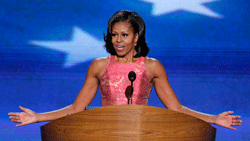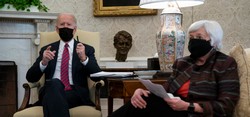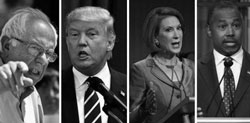Women to Play an Important Role in Election
 Change seems to be on the horizon in terms of female representation and involvement in the political spectrum, primarily stemming from the ultimate need for the female vote in this upcoming election.
Change seems to be on the horizon in terms of female representation and involvement in the political spectrum, primarily stemming from the ultimate need for the female vote in this upcoming election.
Such was clearly displayed at both the Republican National Convention (RNC) and the Democratic National Convention (DNC) during their respective times. It was here at these conventions that women’s rights in the form of health care, contraception, and equal pay were discussed in the hopes to obtain the female voters attention and female speakers’ approval alike.
Micah Reilly, a junior communication student, advocates that these are the right motions to be going through in order to draw in the female voter. “Chances are that the only thing that is going to make someone pay attention is when there is a problem or a cause that directly speaks to that person, or in this case that demographic. By talking about the issues, like contraception I know is a big one, the female voters are going to listen and then hopefully go with the side that offers the best solution in their eyes,” says Reilly.
He goes on to mention that the most important part about such issues being discussed is not necessarily about what was being talked about, but who was talking about it. “I know that if women’s issues were being discussed by a man then the female populous is not going to fully be able to support that individual, not matter their stance on the problem. If it is a woman talking about a woman’s issue, though there is more common ground between the speaker and the voter, which would make the speaker come off as more identifiable and the voter would be more likely to support that person,” contends Reilly.
And it would appear that the Democrats and Republicans saw it the same way as Reilly. Both conventions held a strong lineup of politically involved female speakers to discuss said topics; from the RNC there was South Carolina Governor Nikki Haley, former Secretary of State Condoleeza Rice, and Mia Love of Utah, whereas the DNC courted speakers by the likes of Georgetown law student Sandra Fluke and Massachusetts Senate candidate Elizabeth Warren.
Lisa Califano, a sophomore political science student, states that she was happy with the hard facts concerning the issues and how they were being presented by women in very politically active roles. “It’s nice to see that women are presenting the statistics and are getting involved and aren’t just there for the emotional role, which is very important too, but it is nice to see how they are not limited in how they present their facts and how they are able to speak,” says Califano.
This emotional role that Califano mentions was one that was exhibited at the two conventions again, but this time by First Lady Michelle Obama at the DNC and Ann Romney at the RNC. Both women delivered heavily emotional speeches presenting them in everyday roles as mothers and wives, a key identifying trait for most American women. It should be known that although the speeches at the convention were running along the lines of ethos, both women are not limited to just the emotional spectrum. Each is free to speak about factually based, non-politically dismissive problems and issues, and often times adopt such into causes that they end up advocating for; for instance, Michelle Obama’s fight against childhood obesity or Ann Romney’s support of the Multiple Sclerosis Society.
Could this be the true equation then? The key to obtaining the female vote? Is it all simply about getting a woman to speak about women’s issues and then have the wives of both candidates serve as that emotional, factual segue? According to Professor Schmidt, the Director of Advising Critical Discourse Coordinator, it’s not all that simple. “I think what you find with Michelle Obama [for example] is there are more working women looking at her and saying she’s a strong female, she’s got her own set of ideas on where things should go, she’s a voice for her husband to listen to, to bounce ideas off of. [Whereas] I don’t think that is the same relationships the Romneys have. There is a loving relationship and a support system there, but overall it’s just going to pull in a different type of women,” Schmidt states. Reilly agrees with Schmidt’s point, stating that “There is no universal rule for pulling in the female voters, sure there are certain things that you could do to pull in a little more of that audience, but it all basically comes down to that fact that in the end you either draw in any type of audience at all or not.”
However, Schmidt does, in fact, believe that the first ladies are a crucial tool in the fight to gaining politically involved females attention. “I think first ladies help immensely when it comes to is this person [the candidate] a human or a politician,” says Schmidt, “They are the humanizing link and there is an integral part to being that woman who can help her husband get to where he wants to get. But they are also the heart and a strength that isn’t necessarily seen from the candidate on the political platform.”
According to Lisa Burns, author of “First Ladies and the Fourth Estate: Press Framing for Presidential Wives”, the four main themes of a first lady include that of a public woman, a political celebrity, a political activist, and a political interloper. Although this is a position that isn’t one of electoral status, requires no official duties other than being the hostess of the White House, and receives no salary, perhaps a fifth theme should be added to list; a lady of the common female voice.
The female vote is evidently crucial this year as the struggle between the Democrats and Republicans shows, however instead of looking to the men in this war maybe the stage should be focused on the ladies in charge. For nobody knows a woman better than a woman.



